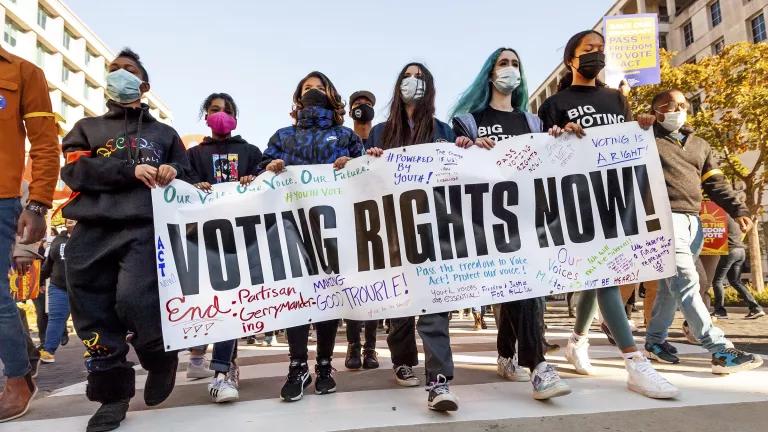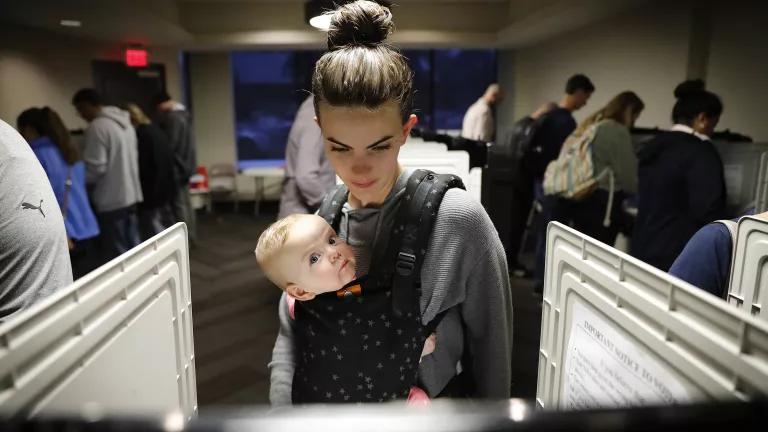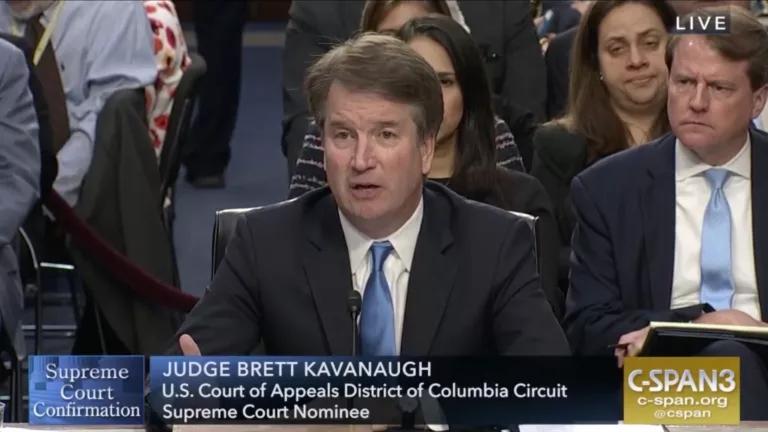Standing Up to Attacks on Democracy
We know that, much as the strength of democracy has a direct bearing on NRDC’s mission, efforts to undermine it benefit those seeking to block environmental protections.

Young voting rights activists lead a march to the White House on November 3, 2021, demanding that the Biden administration take the lead on voting rights.
We know that, much as the strength of democracy has a direct bearing on NRDC’s mission, efforts to undermine it benefit those seeking to block environmental protections.
A year after rioters attacked the U.S. Capitol and put the Congress to flight in a violent attempt to thwart the will of the voters, American democracy itself is under assault across three broad fronts.
Since the bloody insurrection last January, Arizona, Florida, Georgia, Texas, and at least 15 other states have enacted new laws that make it harder for some people to vote—especially the low-income communities and people of color who struggle the most to have their voices heard.
Anti-voter forces are waging a baseless campaign to undermine public confidence in the integrity of our elections, in a cynical attempt to sow doubt in the legitimacy of our democracy itself, while working to make it easier for state legislatures, not voters, to determine the outcome of elections.
And there’s an ongoing assault on truth itself, led by the big lie that Donald Trump didn’t actually lose the 2020 election. He did, by more than 7 million votes. More than a year later, though, nearly 7 Republicans in 10 say, against all evidence, the election was stolen. And 30 percent of the party thinks “true American patriots may have to resort to violence in order to save our country.”
Any of this, on its own, would pose an alarming threat to our democracy. Together, it’s a full-on assault. We will rise, as a nation, to confront this crisis, or our democracy will suffer grave harm. We cannot allow that to happen.
Democracy is not some optional add-on that the country can afford to see damaged. It’s foundational to who we are: a nation governed by the consent of the governed. It’s how we gather our greatest strength—the will of the majority, the judgment of the whole, and the collective genius of all our people—around the values, interests, and aspirations we share.
It’s how we, a nation rich with diversity, confront common challenges, seize opportunities, agree upon goals, and achieve them. It’s how we create a more just and equitable society where the people are truly sovereign. There’s nothing more important to the health of this nation than the quality of our democracy.
There’s nothing more important, either, to the health of the environment.
A working democracy is why we have safeguards in place to protect us from breathing polluted air, drinking contaminated water, and watching rapacious profiteers lay ruin to the natural systems that support all life. It’s because we, the people, raised our voices to demand those safeguards decades ago, when all of that was threatened, and we had the power to hold our leaders to account.
We’re struggling to effect the change we need now, even though 85 percent of the country supports federal action to protect the environment and two-thirds of the country wants our government to do more to fight climate change. That’s a reason to strengthen our democracy, not weaken it, so our government becomes more responsive, not less, to the most urgent needs of the people.
Engaging the voice and views of the people is, in fact, as vital to creating sound environmental policy as it is to good governance. That was enshrined three decades ago, when the United Nations (U.N.) adopted the principle that people affected by policy decisions that impact the environment have a fundamental right to have:
- access to the information they need to assess the risk of environmental harm;
- access to participation in decision-making;
- and access to judicial and administrative proceedings that enable them to seek remedies for damages suffered.
In adopting these so-called “access rights” for environmental issues, the U.N. underscored the three foundational requirements for functioning democracy anywhere: the right of the people to know the truth about what their government does, or fails to do, on their behalf; the right to speak out and be heard; and the right to hold our leaders to account when they fail to act in the public interest.
With the fate of democracy itself in the balance, the Senate must act immediately to pass two key pieces of legislation mirroring bills the House has already passed.
The first is the Freedom to Vote Act, the Senate successor to the For the People Act the House passed last March.
The Freedom to Vote Act would set national standards that states must meet to ensure our right to vote. It would prohibit the kinds of voter suppression efforts inherent in the raft of new state laws that restrict voting. It would protect the institutions we rely on for access to the ballot and the public servants who help to ensure the transparency and integrity of our elections.
It would help voters better understand who’s paying to support candidates and their positions. And it would better protect the public from the nefarious impact of gerrymandering, the practice by state legislatures of manipulating the boundaries of congressional districts to unfairly favor one party at the expense of the voters.

Representative John Lewis speaks to the media ahead of the House voting on the Voting Rights Advancement Act, on December 6, 2019.
Next is the John R. Lewis Voting Rights Advancement Act, passed by the House last summer and introduced in the Senate last fall. Named for the late Civil Rights champion John Lewis, this bill would strengthen voting rights protections that were weakened in 2013, when the Supreme Court struck down key provisions of the landmark Voting Rights Act of 1965.
It would restore protections against voting laws, for example, that disproportionately discourage participation from people based on their race or age. It provides tools to help identify and track voting procedures in states that have a recent history of voter discrimination. And it would allow the U.S. Attorney General to send federal observers to areas where there’s a serious threat of racial discrimination at the polls.
These bills won’t address every challenge to American democracy. If enacted, though, they would help to protect it in the face of mounting attacks. The Senate has no more urgent task than to pass both of these bills without delay.
Successful nations don’t stand idle in the face of grave and gathering threats. We take action to confront those threats. That’s why we’re counting on the Senate to pass these bills.
It may require a change in the Senate rules to protect these bills from the threat of a filibuster that takes 60 votes to overcome. The quality of American democracy is too important to be held hostage to parliamentary process.
There’s more, of course, we must do.
The quality of our democracy reflects, in large part, the health of our society. What are we doing to address the yawning disparity in wealth, income, and opportunity? Why does our government so often put special interests ahead of the public good? How well are we educating our children, investing in our future, and serving the best interests of all our people? What will it take to restore some measure of trust and goodwill among those of differing perspectives, so that we’re able to disagree in a civil and respectful way, and keep talking and working toward compromise? Why do more than half of the people in some parts of the country believe our government isn’t working for them?
Ultimately, though, democracy is about accountability, and those who seek to undermine it must be held to account.

FBI flyers seek information on Capitol attack perpetrators.
That’s why the work of the House Select Committee to Investigate the January 6th Attack on the United States Congress is so important and must be supported. It’s why those arrested for attacking the Capitol last year—more than 700 so far—must understand that we won’t tolerate violent attacks on the citadel of American democracy. And it’s why we all have a responsibility to stand up for our democracy, especially in times of testing.
“Democracy needs champions,” President Biden said last month while hosting the Summit for Democracy. “We have to stand for justice and the rule of law, for free speech, free assembly, a free press, freedom of religion, and for all the inherent human rights of every individual.”
Those words have resonance beyond U.S. shores, where many nations view the United States not as a perfect democracy but as a country committed to a government that serves at the will of the people, and not the other way around.
Domestic attacks meant to weaken our democracy make it harder for this country to maintain that role, at a time when civil liberties, political freedom, and democracy itself are under assault worldwide, in countries like Brazil, Ethiopia, Hungary, Russia, and Turkey to name just a handful.
This undermining of democracy also makes it harder to protect the foundations of open governance and civil society—an independent judiciary, the rule of law, a thriving community of nongovernmental organizations, and a free press. Last year, a record 293 journalists were jailed worldwide, and another 24 killed, as some governments employed draconian state laws and surveillance technology to silence professionals working to tell the truth.
In Poland, the rise of the populist Law and Justice Party has, since 2015, ushered in efforts to exert growing political control over the news media and judicial system, while putting civil rights, political freedom, and even the rule of law at risk.
We know at NRDC that, much as the quality of democracy has a direct bearing on our mission—since strengthening democracy plays to core values like equity, integrity, and justice—efforts to undermine democracy and civil society can benefit those interests that seek to block sound environmental protections.
In Mexico, for example, where democracy and rule of law are both in danger of backsliding in ways that threaten civil liberties and political rights, consumers are paying higher prices for dirtier energy, after efforts by the ruling party to prop up state-owned oil and power companies with taxpayer subsidies and so-called “reforms” that hurt private competitors.
For our country, as for all others, our greatest strength is our people. History has shown us, again and again, that we can make remarkable progress andaccomplish astonishing goals when we gather the strengths of all of our people around the hopes and values and interests we share.
An attack on democracy is an attack on all of that. It’s an attack on the beating heart of the nation.
Democracy alone can’t solve every problem, but we can’t solve anything without it. American democracy has never been perfect. It will always be a work in progress, something we strengthen or weaken, each of us, through millions of actions, large and small, every day.
On this day, in this moment, we’re called as a nation to stand up and do our part—to defend our democracy, as past generations have done before, so that vote by vote, and voice by voice, we’ll keep moving closer toward our unifying ideal: out of many, one.



